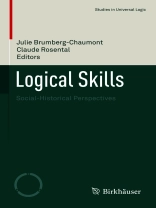This contributed volume explores the ways logical skills have been perceived over the course of history. The authors approach the topic from the lenses of philosophy, anthropology, sociology, and history to examine two opposing perceptions of logic: the first as an innate human ability and the second as a skill that can be learned and mastered. Chapters focus on the social and political dynamics of the use of logic throughout history, utilizing case studies and critical analyses.
Specific topics covered include:
- the rise of logical skills
- problems concerning medieval notions of idiocy and rationality
- decolonizing natural logic
- natural logic and the course of time
Logical Skills: Social-Historical Perspectives will appeal to undergraduate and graduate students, as well as researchers in the fields of history, sociology, philosophy, and logic. Psychology and colonial studies scholars will also find this volume to be of particular interest.
สารบัญ
Introduction.- Part I. “Primitives” and Civilized Men.- Decolonizing “Natural Logic”.- Natural Logic, Anthropological Antilogies, and Savage Thought in the 19th Century.- Referring to Logical Skills to Assess the Rationality of an Ethnic Group: The Zande Case in the History of the Social Sciences.- “Some Stages of Logical Thought”: From Native Certainties to Acquired Doubts.- Part II. Educated and Disabled Men.- The Rise of Logical Skills and the 13th Century Origins of the “Logical Man”.- Anti-dialecticians in the Middle Ages: Historiographic Myth or Reality?.- Illogical Thinking: Problems Concerning Medieval Notions of “Idiocy” and “Rationality”.- Natural Logic and the Course of Time: From Theology to Developmental Psychology.- Index.
เกี่ยวกับผู้แต่ง
Julie Brumberg-Chaumont, Research Professor – Centre National de la Recherche Scientifique (PSL/CNRS)
Claude Rosental, Research Professor – Sociology, Centre National de la Recherche Scientifique (CNRS)












